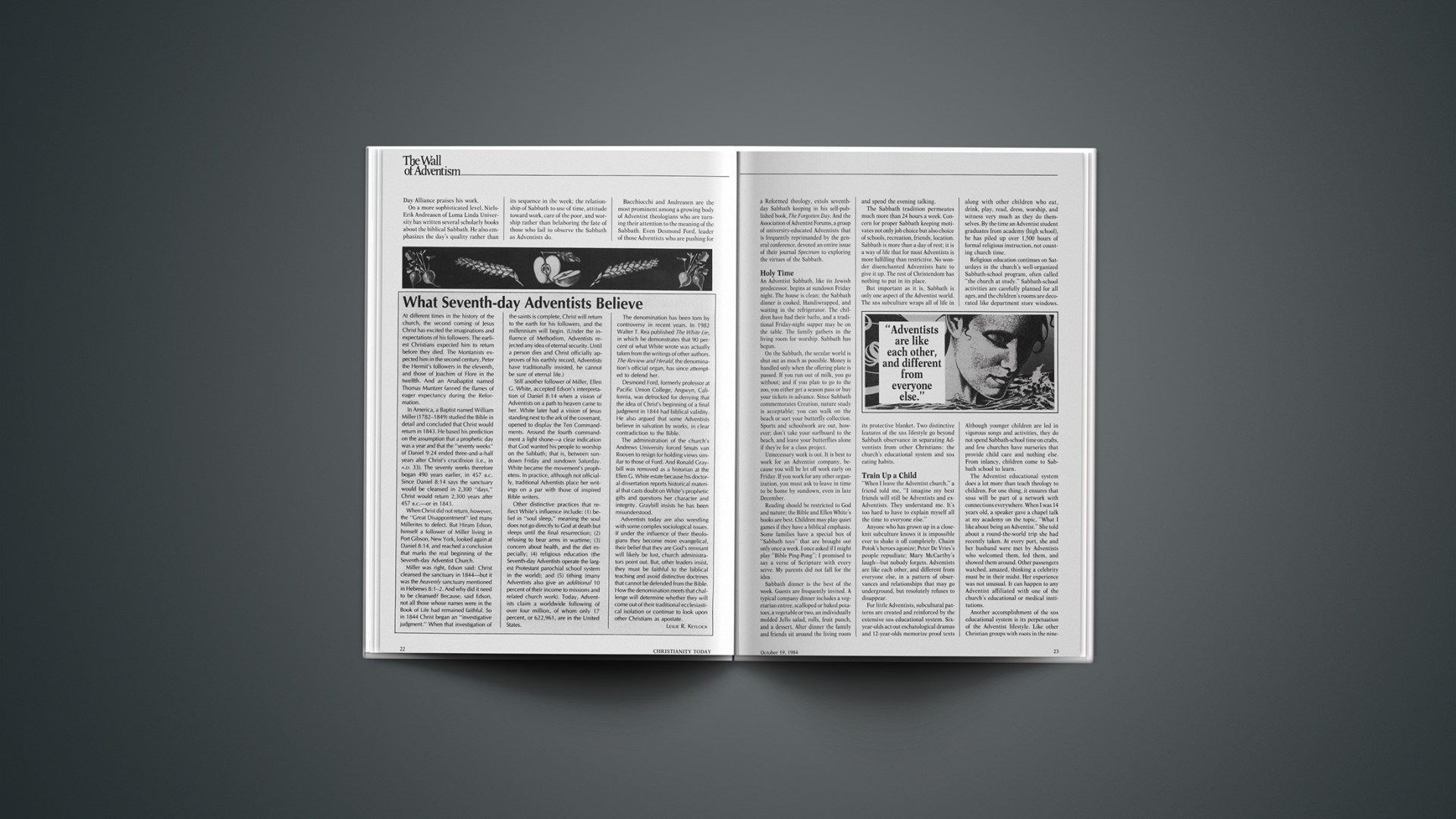At different times in the history of the church, the second coming of Jesus Christ has excited the imaginations and expectations of his followers. The earliest Christians expected him to return before they died. The Montanists expected him in the second century, Peter the Hermit’s followers in the eleventh, and those of Joachim of Flore in the twelfth. And an Anabaptist named Thomas Muntzer fanned the flames of eager expectancy during the Reformation.
In America, a Baptist named William Miller (1782–1849) studied the Bible in detail and concluded that Christ would return in 1843. He based his prediction on the assumption that a prophetic day was a year and that the “seventy weeks” of Daniel 9:24 ended three-and-a-half years after Christ’s crucifixion (i.e., in A.D. 33). The seventy weeks therefore began 490 years earlier, in 457 B.C. Since Daniel 8:14 says the sanctuary would be cleansed in 2,300 “days,” Christ would return 2,300 years after 457 B.C.—or in 1843.
When Christ did not return, however, the “Great Disappointment” led many Millerites to defect. But Hiram Edson, himself a follower of Miller living in Port Gibson, New York, looked again at Daniel 8:14, and reached a conclusion that marks the real beginning of the Seventh-day Adventist Church.
Miller was right, Edson said: Christ cleansed the sanctuary in 1844—but it was the heavenly sanctuary mentioned in Hebrews 8:1–2. And why did it need to be cleansed? Because, said Edson, not all those whose names were in the Book of Life had remained faithful. So in 1844 Christ began an “investigative judgment.” When that investigation of the saints is complete, Christ will return to the earth for his followers, and the millennium will begin. (Under the influence of Methodism, Adventists rejected any idea of eternal security. Until a person dies and Christ officially approves of his earthly record, Adventists have traditionally insisted, he cannot be sure of eternal life.)
Still another follower of Miller, Ellen G. White, accepted Edson’s interpretation of Daniel 8:14 when a vision of Adventists on a path to heaven came to her. White later had a vision of Jesus standing next to the ark of the covenant, opened to display the Ten Commandments. Around the fourth commandment a light shone—a clear indication that God wanted his people to worship on the Sabbath; that is, between sundown Friday and sundown Saturday. White became the movement’s prophetess. In practice, although not officially, traditional Adventists place her writings on a par with those of inspired Bible writers.
Other distinctive practices that reflect White’s influence include: (1) belief in “soul sleep,” meaning the soul does not go directly to God at death but sleeps until the final resurrection; (2) refusing to bear arms in wartime; (3) concern about health, and the diet especially; (4) religious education (the Seventh-day Adventists operate the largest Protestant parochial school system in the world); and (5) tithing (many Adventists also give an additional 10 percent of their income to missions and related church work). Today, Adventists claim a worldwide following of over four million, of whom only 17 percent, or 622,961, are in the United States.
The denomination has been torn by controversy in recent years. In 1982 Walter T. Rea published The White Lie, in which he demonstrates that 90 percent of what White wrote was actually taken from the writings of other authors. The Review and Herald, the denomination’s official organ, has since attempted to defend her.
Desmond Ford, formerly professor at Pacific Union College, Angwyn, California, was defrocked for denying that the idea of Christ’s beginning of a final judgment in 1844 had biblical validity. He also argued that some Adventists believe in salvation by works, in clear contradiction to the Bible.
The administration of the church’s Andrews University forced Smuts van Rooyen to resign for holding views similar to those of Ford. And Ronald Graybill was removed as a historian at the Ellen G. White estate because his doctoral dissertation reports historical material that casts doubt on White’s prophetic gifts and questions her character and integrity. Graybill insists he has been misunderstood.
Adventists today are also wrestling with some complex sociological issues. If under the influence of their theologians they become more evangelical, their belief that they are God’s remnant will likely be lost, church administrators point out. But, other leaders insist, they must be faithful to the biblical teaching and avoid distinctive doctrines that cannot be defended from the Bible. How the denomination meets that challenge will determine whether they will come out of their traditional ecclesiastical isolation or continue to look upon other Christians as apostate.










